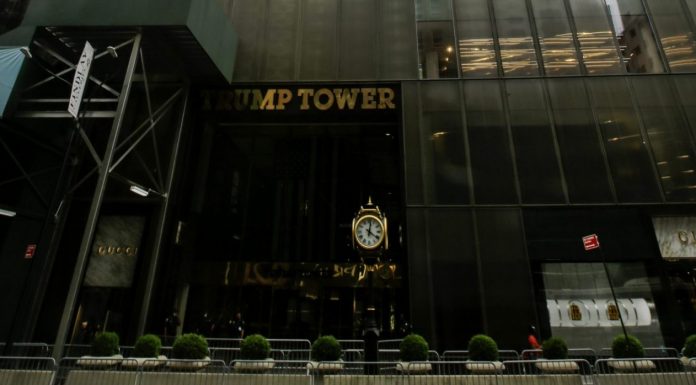(Headline USA) A recent New York Times article smearing President Donald Trump over his finances said Trump must pay back more than $300 million in loans over the next four years.
According to partisan attacks, Trump’s alleged debt raised the possibility of an unprecedented situation should he win a second term and not be able to raise the money: that lenders might foreclose on the leader of the free world.
But financial experts say the notion of Trump going broke anytime soon is farfetched.
Trump has dismissed the Times article that purportedly obtained his tax records under suspicious circumstances. He has indicated that the records were incomplete.
But even with a total debt load across his entire business empire estimated at more than $1 billion, experts noted Trump would still have plenty of property and assets he could cash in.
Among the holdings in his portfolio are office and condo towers, golf courses and branding deals that have been valued at $2.5 billion.
Based on Forbes magazine estimates of the value of his buildings, for instance, selling his partial interests in just two properties—an office complex in San Francisco and a Las Vegas tower that houses a hotel and condos—could bring in $500 million alone.
Even the Times report was quick to note that tax filings alone can’t help determine someone’s net worth.
Plenty of real estate investors report big losses under tax accounting rules, including sometimes generous depreciation charges that reflect expected wear and tear on buildings.
Phillip Braun, a finance professor at Northwestern University’s Kellogg School of Business, said Trump’s minuscule tax payments don’t surprise him, nor do the losses claimed. “His accountants work really to make sure he doesn’t pay any taxes,” he said.
A better idea of how Trump is faring, Braun said, comes from Trump’s operating profits.
“The real estate lending market is difficult at the moment, but for buildings throwing off cash? That shouldn’t be a problem,” said Bernard Kent, chairman at Schechter Investment Advisors in Detroit.
“For something like Trump Tower, the future cash flow wouldn’t be tremendously affected by COVID-19 or people moving out of New York,” he said. “Top-flight properties there tend to hold value.”
Forbes, which has been valuing Trump properties for decades for its annual billionaire issue, says Trump’s 40 Wall Street office tower generated $18 million in operating profits in 2019, Trump Tower $13 million, and Trump’s share in San Francisco’s 555 California Street tower $26 million.
According to Forbes’s latest valuation, even pandemic-reduced prices leave Trump with $2.5 billion worth of properties and other assets, and that is after subtracting his $1.2 billion in debt.
The Times said Trump’s real estate company has $421 million in loans he has personally guaranteed, with $300 million of that coming due over four years.
The Trump Organization did not immediately respond to an email and phone call requesting comment.
Trump dismissed the Times story as “fake news” and said he is “extremely underleveraged.”
“I have very little debt compared to the value of assets,” he wrote.
Among his lenders listed in his personal financial disclosure are New York-based commercial lender Ladder Capital, which is owed at least $110 million, and Bryn Mawr Trust Co. a suburban Philadelphia bank, which held Trump debt worth between $5 million and $25 million for Seven Springs, a New York estate owned by the Trump Organization.
Trump’s biggest lender on his disclosure is Deutsche Bank, his chief financier stretching back two decades.
It helped him buy and fix up several buildings in New York and Chicago and his Doral golf club in Miami. It is owed at least $125 million, with loans coming due in 2023 and 2024.
One option for Trump is to get his lenders to refinance his debt or to take out a new loan. Deutsche Bank is an obvious candidate to help him with either because it has been so forgiving to him over the years.
“If I was sitting at my old job and a Trump loan was coming due next year and he’s the president, I would just say let’s extend the maturity,” said Mike Offit, a former executive at Deutsche Bank who lent to Trump in the late ’90s
If all were lost, and Trump were really in trouble, some experts say there is another way he could raise money to pay off his lender: copy rocker David Bowie, who sold bonds that allow investors to make money off his music royalties.
“Trump Bonds” would enable investors to share in his future earnings from selling his name to, say, condo builders or purveyors of steaks or colognes or neckties.
“Trump has a brand that has value,” Kent said.
Adapted from reporting by the Associated Press

